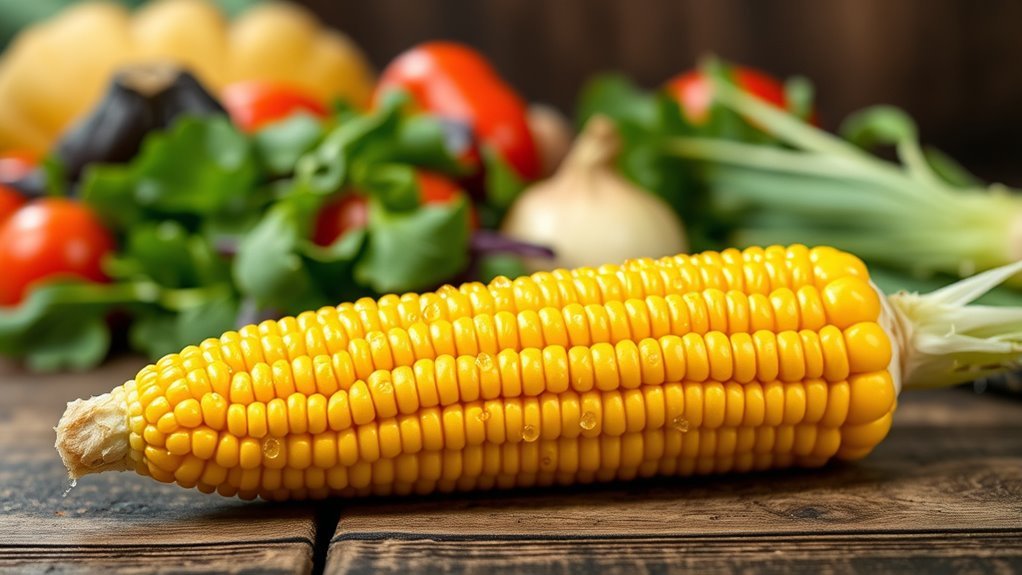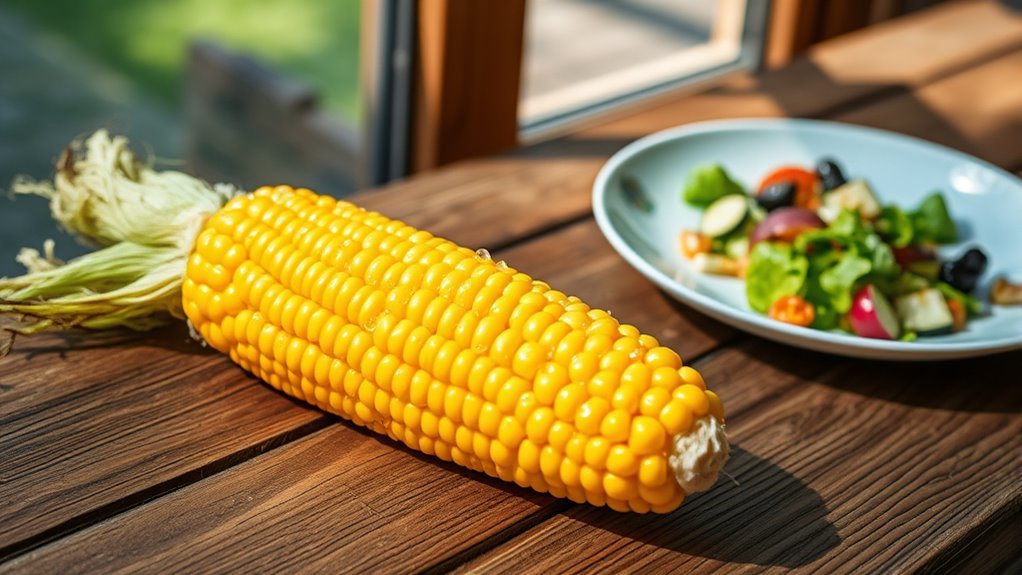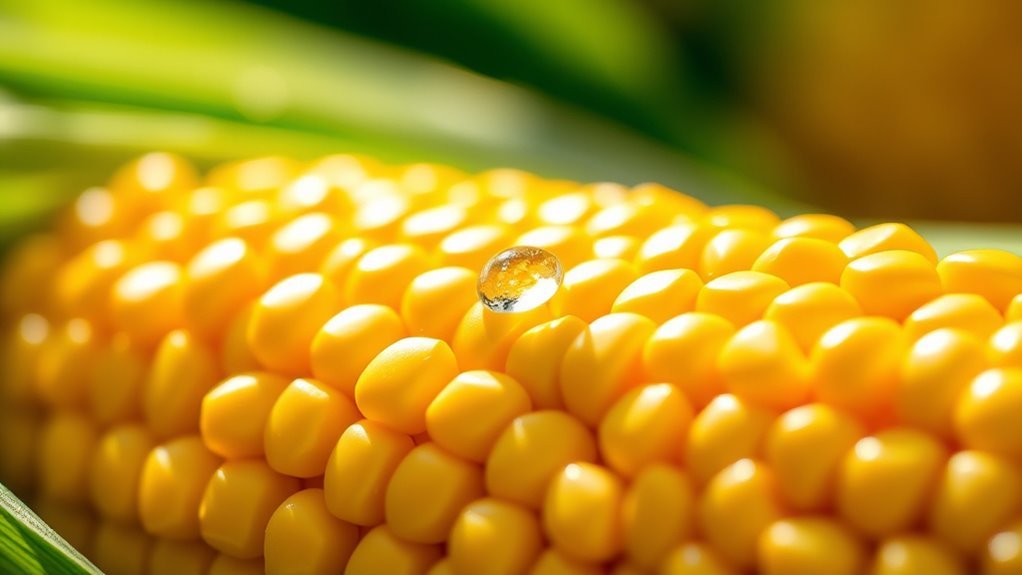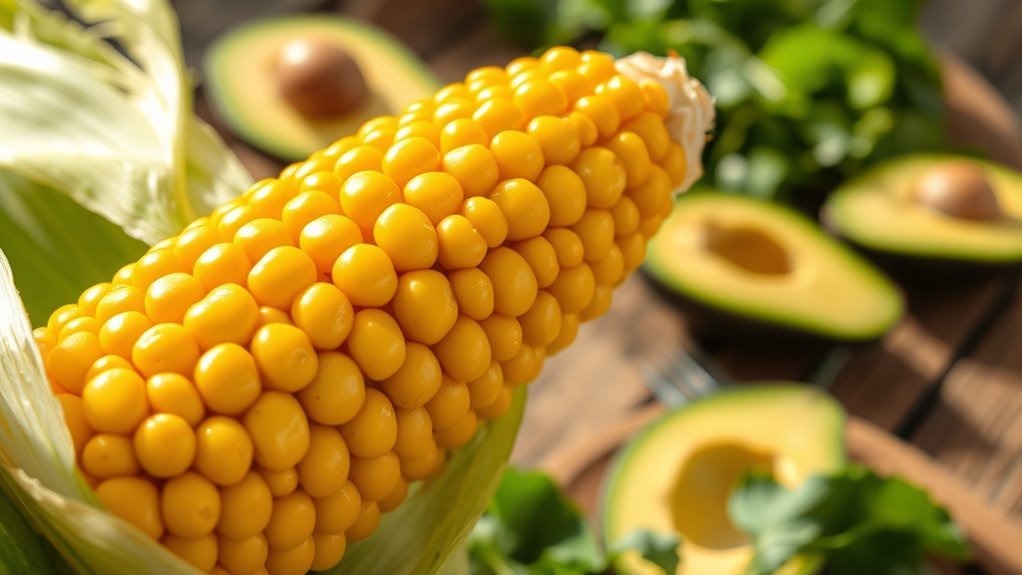Corn isn’t typically considered keto-friendly due to its high carbohydrate content, which can compromise your ketosis. A medium ear of corn has about 25 grams of carbs, while a cup of cooked corn can deliver around 30 grams, potentially pushing you over your daily limit. However, if you choose to enjoy corn, portion control is key. By making mindful choices, you can still incorporate it into your diet. There’s more to explore about alternatives and moderation strategies.
Understanding the Ketogenic Diet

When you plunge into the ketogenic diet, you’ll find it’s designed to shift your body into a state of ketosis, where it primarily burns fat for fuel instead of carbohydrates. Understanding the keto fundamentals is essential, as this diet emphasizes high fat, moderate protein, and very low carbohydrate intake. The diet principles focus on reducing insulin levels, promoting fat loss, and improving overall energy levels. By limiting carbs, you encourage your body to utilize fat stores for energy, leading to effective weight management. It’s important to choose healthy fats and avoid processed foods to maximize benefits. Embracing these principles can give you the freedom to enjoy a variety of delicious, satisfying meals while successfully steering your keto journey.
Nutritional Profile of Corn

When considering corn’s nutritional profile, it’s important to look at its carbohydrate content, which can greatly impact your keto goals. You’ll also want to take into account its fiber and nutrient composition, as well as its glycemic index, to understand how it affects blood sugar levels. By examining these factors, you can make a more informed decision about including corn in your diet.
Carbohydrate Content Analysis
Corn, often regarded as a staple in many diets, presents a unique nutritional profile that warrants careful examination, especially for those following a ketogenic regimen. When you look at the carbohydrate content, you’ll find it varies by corn varieties. For example, sweet corn has more carbs than field corn. Here’s what you should know:
- A cup of sweet corn contains about 27 grams of carbs.
- Corn preparation methods can impact overall carb counts.
- Corn products like tortillas and polenta can be surprisingly carb-dense.
- Moderation is key if you’re considering corn on a keto diet.
Understanding the carbohydrate content helps you make informed choices while enjoying the freedom of diverse foods within your diet.
Fiber and Nutrients
While monitoring carbohydrate intake is essential on a keto diet, the fiber and nutrient profile of corn also deserves attention. Corn is a good source of dietary fiber, offering benefits like improved digestion and enhanced satiety, which can be particularly valuable when you’re trying to manage hunger on a lower-carb diet. Additionally, corn boasts a decent nutrient density, providing essential vitamins and minerals such as vitamin B6, magnesium, and potassium. These nutrients support overall health and energy levels. However, it’s crucial to balance these benefits against the carb content. If you choose to include corn, consider portion sizes to align with your keto goals while still gaining the advantages of its fiber and nutrient profile.
Glycemic Index Considerations
How does corn’s glycemic index impact your keto diet? Corn has a moderate glycemic index, which means it can cause a noticeable insulin response. If you’re aiming to stay in ketosis, understanding corn’s glycemic load is essential. Here’s what you should consider:
- Moderation is key: Small amounts might fit into your meal plan.
- Check your portions: Larger servings can spike blood sugar.
- Balance with fats: Pairing corn with healthy fats may help mitigate insulin spikes.
- Listen to your body: Everyone’s response to carbs varies; monitor how you feel after eating corn.
Being informed about corn’s glycemic index can help you make better choices while enjoying the freedom your keto diet offers.
Carbohydrate Content in Corn

When considering the carbohydrate content in corn, it’s essential to note that a medium ear of corn contains about 25 grams of carbohydrates. This varies slightly among different corn varieties; for instance, sweet corn might have more carbs than field corn. When you think about serving sizes, a cup of cooked corn can pack around 30 grams of carbohydrates, which can greatly impact your daily carb limit on a keto diet. Understanding these numbers can help you make informed choices. If you’re aiming to stay within a low-carb framework, you’ll want to measure portions carefully and consider alternatives. Ultimately, having a solid grasp of corn’s carbohydrate content empowers you to enjoy your meals while staying aligned with your dietary goals.
Effects of Corn on Ketosis
Although corn is often enjoyed for its sweet flavor and versatility, its impact on ketosis can be significant due to its high carbohydrate content. When you consume corn, your body processes it through corn metabolism, which can lead to increased glucose levels, potentially disrupting ketosis.
Here are some key effects of corn on your ketogenic journey:
- High Carb Count: A single ear of corn can exceed your daily carb limit.
- Insulin Response: Eating corn may trigger insulin release, making it harder to maintain ketosis.
- Energy Source Shift: Your body might switch back to glucose as its primary fuel.
- Keto Adaptation: Frequent corn consumption can slow your adaptation to a fat-burning state.
Being mindful of these factors can help you stay on track with your keto goals.
Alternatives to Corn on a Keto Diet
If you’re looking for corn substitutes on a keto diet, there are several low-carb vegetable options to contemplate. Cauliflower rice can mimic the texture of grains, while zucchini noodles offer a satisfying alternative to pasta. Exploring these options can help you maintain your carb limits while still enjoying delicious meals.
Low-Carb Vegetable Options
While corn may be a popular choice for many diets, it doesn’t fit well into the keto lifestyle due to its higher carbohydrate content. Fortunately, there are plenty of low-carb vegetable options you can enjoy. Incorporating these alternatives into your meals can keep your carb count in check while still providing delicious flavors and nutrients. Consider these options:
- Zucchini for vegetable stir fries
- Spinach in low carb salads
- Cauliflower for a rice alternative
- Bell peppers in various dishes
These vegetables can easily be added to your meals, helping you create satisfying low-carb salads and flavorful stir fries without exceeding your carb limits. Embrace these alternatives and enjoy the freedom of a diverse keto-friendly diet!
Cauliflower Rice Substitutes
When you’re looking for alternatives to corn on a keto diet, cauliflower rice stands out as a versatile substitute that can mimic the texture of traditional rice without the high carb count. Not only is cauliflower low in carbs, but it also offers numerous health benefits, including high fiber content and essential nutrients.
Here are some other cauliflower rice substitutes you might consider:
| Substitute | Benefits |
|---|---|
| Zucchini Noodles | Low calorie, hydrating |
| Broccoli Rice | High in antioxidants |
| Shredded Cabbage | Rich in vitamin K |
| Shirataki Rice | Zero calories, filling |
Using these options can help you maintain a diverse and satisfying keto diet while enjoying the benefits of cauliflower.
Zucchini Noodle Alternatives
Although zucchini noodles are a popular choice for those on a keto diet, there are several other alternatives you can explore that provide similar benefits while keeping your carb intake low. Here are some tasty vegetable substitutes to reflect upon:
- Spiralized cucumber: Light and invigorating, perfect for cold dishes.
- Shirataki noodles: Made from konjac yam, these are very low in carbs and calories.
- Spaghetti squash: When cooked, it forms strands similar to pasta and is low in carbs.
- Palmini noodles: Made from hearts of palm, these are a great low-carb pasta alternative.
These options not only help you maintain your keto lifestyle but also add variety to your meals. Embrace your freedom to experiment with flavors and textures!
How to Incorporate Corn Mindfully
Incorporating corn into a keto diet can be challenging, yet it’s possible with mindful choices. To enjoy corn without derailing your keto goals, focus on mindful consumption and portion control. Start by choosing smaller servings—think a few tablespoons of corn in a salad or as a topping, rather than a whole ear. This way, you can savor its flavor while keeping carb intake in check. Pair corn with low-carb vegetables to create a balanced dish that fits your dietary needs. Remember, it’s about moderation; corn can be a tasty addition if you’re aware of how it affects your overall carb count. Enjoy the freedom to include it, but stay mindful of your choices for a successful keto journey.
Final Thoughts on Corn and Keto
While corn can be a tempting option for those on a keto diet, it’s essential to weigh its carb content against your overall dietary goals. The flexibility of keto allows for personal adjustments, but you need to be mindful of corn consumption. Here are some things to take into account:
- Corn is higher in carbs compared to many keto-friendly vegetables.
- It can be enjoyed in moderation if it fits within your daily macros.
- Opt for whole corn products over processed ones for better nutritional value.
- Balance your meals with low-carb foods to maintain ketosis.
Ultimately, it’s all about finding that balance. If you love corn, don’t shy away completely—just be strategic about how you include it in your keto journey!
Frequently Asked Questions about Corn on Keto Diet
1. Is corn allowed on a keto diet?
Corn is generally not considered keto-friendly due to its high carbohydrate content. A typical serving of corn can contain around 25 grams of carbs, which is often more than the daily limit for those following a strict ketogenic diet. Therefore, it’s best to avoid corn and opt for lower-carb vegetables instead.
2. What are the carb counts for different types of corn?
The carb counts can vary depending on the type of corn. For example, one cup of cooked corn kernels has approximately 27 grams of carbohydrates. Corn on the cob contains about 24 grams of carbs per medium ear. Popcorn, while a whole grain, is also high in carbs, with around 30 grams per three-cup serving. These values make corn unsuitable for a ketogenic diet.
3. Are there any alternatives to corn that are keto-friendly?
Yes, there are several keto-friendly alternatives to corn. Vegetables like zucchini, cauliflower, and bell peppers can provide similar textures and flavors in dishes without the high carbohydrate content. For example, cauliflower can be used to make rice or mash, while zucchini can be spiralized into noodles.
4. Can I have corn in moderation on a keto diet?
While some people may choose to incorporate small amounts of corn into their diet, it can be tricky to manage carb intake, especially if you’re trying to stay under 20-50 grams of carbs per day. If you do decide to include corn, it’s advisable to monitor your overall carb consumption closely and consider it as a part of your total intake for the day. However, for strict adherence to the keto diet, it’s generally recommended to avoid corn.
5. What are the health benefits of corn?
Corn does have some health benefits, including being a good source of fiber, vitamins, and minerals such as B vitamins, magnesium, and potassium. It also contains antioxidants that can support overall health. However, these benefits are often outweighed by its high carbohydrate content, making corn less desirable for those on a ketogenic diet. It’s best to focus on low-carb vegetables that also offer health benefits without compromising your dietary goals.
References
- https://www.healthline.com/nutrition/low-carb-diet-foods#corn
- https://www.ncbi.nlm.nih.gov/pmc/articles/PMC7070015/
- https://www.dietdoctor.com/low-carb/what-to-eat
- https://www.washingtonpost.com/food/2020/09/30/what-is-keto-diet/
- https://www.everydayhealth.com/diet-nutrition/diets/keto/the-ketogenic-diet-what-you-need-to-know/
- https://www.webmd.com/diet/what-is-the-keto-diet
- https://www.mayoclinic.org/healthy-lifestyle/nutrition-and-healthy-eating/expert-answers/keto-diet/faq-20422981


